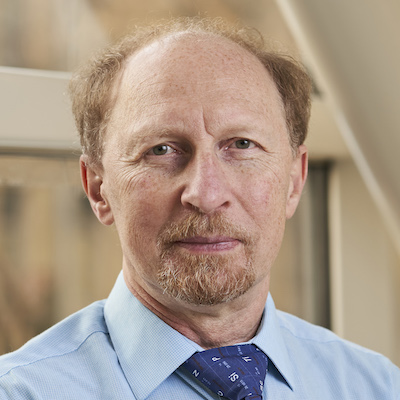Research Interests:
- Tumor genomics effects on immune landscape and angiogenesis
- Transforming growth factor beta in tumor-host interactions
- Genomics of tumor DNA repair response
Biography
Dr. Bakin graduated with honors from the Moscow Lomonosov University and earned his doctoral degree in Molecular Biology at the Moscow Lomonosov University. He received postdoctoral training in oncogenes with Dr. Tom Curran at St. Jude Children's Hospital and in breast cancer biology with Dr. Carlos Arteaga at Vanderbilt University.
Dr. Bakin has done pioneering research in the fields of ribosome biogenesis and epithelial-mesenchymal transition. His work contributed to better understanding of tumor angiogenesis and metastasis.
Dr. Bakin has significant experience in signal transduction, genomics, and proteomics. His research involves preclinical cancer models including patient-derived xenografts.
Dr. Bakin is the course director for Regulatory Mechanism, a graduate-level course in the Cancer Genetics, Genomics and Development PhD Program.
Positions
Roswell Park Comprehensive Cancer Center
- Associate Professor of Oncology
- Department of Cancer Genetics and Genomics
Background
Education and Training
- PhD — Molecular Biology, Moscow Lomonosov University, Moscow, Russia
- MSc — Bioorganic Chemistry, Moscow Lomonosov University, Moscow, Russia
Professional Memberships
- Member, American Association for Cancer Research
- Member, American Society for Cell Biology
- Member, Metastasis Research Society
- Editorial Board Member, Cells
- Editorial Board Member, BMC Cancer
- Editorial Board Member, Frontiers in Oncology
Honors & Awards
- Graduate Student Association Award for Faculty Excellence in Mentoring and Teaching
Research Overview
Current program explores two research directions: a) how the tumor-stroma crosstalk promotes tumor angiogenesis and immune suppressive microenvironment; b) exploits dysregulation in DNA repair for innovative treatment strategies.
Our group identified specific molecular pathways activated by the tumor-fibroblast crosstalk that stimulate tumor vasculature and metastasis, in part through mobilization of pro-tumor immune cells. This project is a collaborative effort with Dr. Scott Abrams (Department of Immunology). The proteomics aspect of this research is investigated in collaboration with Dr. Paul Wallace, Department of Flow and Image Cytometry.
Our group explores a dysregulation in DNA repair for selective poisoning of tumor cells carrying mutant p53, including breast, gastric and pancreatic cancers. The goal is to translate our basic research findings into clinical applications. This project involves basic science researchers and clinicians. Important outcome of our research is the first-in-human Phase 1 clinical trail directed by Dr. Christos Fountzillas.
Dr. Bakin mentored six postdoctoral trainees, ten graduate students, and over twenty undergraduate students. One of his postdoctoral trainees is now a tenured Associate Professor and his former graduate students occupy tenure-track faculty positions.
*Currently accepting students in MSc and PhD programs
View the Bakin LabPublications
1. Zonneville J, Wong V, Limoge M, Nikiforov M, Bakin AV. TAK1 signaling regulates p53 through a mechanism involving ribosomal stress. Sci Rep. 2020;10(1):2517. PubMed PMID: 32054925; PMCID: PMC7018718.
2. Zonneville J, Colligan S, Grant S, Miller A, Wallace P, Abrams SI, Bakin AV. Blockade of p38 kinase impedes the mobilization of protumorigenic myeloid populations to impact breast cancer metastasis. Int J Cancer, 2020, 147 (8):2279-2292; PMID: 32452014
3. Zonneville J, Wang M, Alruwaili MM, Smith B, Melnick M, Eng KH, Melendy T, Park BH, Iyer R, Fountzilas C, Bakin AV. Selective therapeutic strategy for p53-deficient cancer by targeting dysregulation in DNA repair. Communications Biology. 2021;4(1):862. PubMed PMID: 34253820; PMCID: PMC8275734.
4. Bianchi-Smiraglia A, Paesante S, Bakin AV. Integrin β5 contributes to the tumorigenic potential of breast cancer cells through the Src-FAK and MEK-ERK signaling pathways. Oncogene. 2012. PMID:2282479
5. Gervasi M, Bianchi-Smiraglia A, Cummings M, Zheng Q, Wang D, Liu S, Bakin AV. 2012. JunB contributes to Id2 repression and the epithelial-mesenchymal transition in response to transforming growth factor-β. J Cell Biol. 196(5):589-603. PMID: 223910
